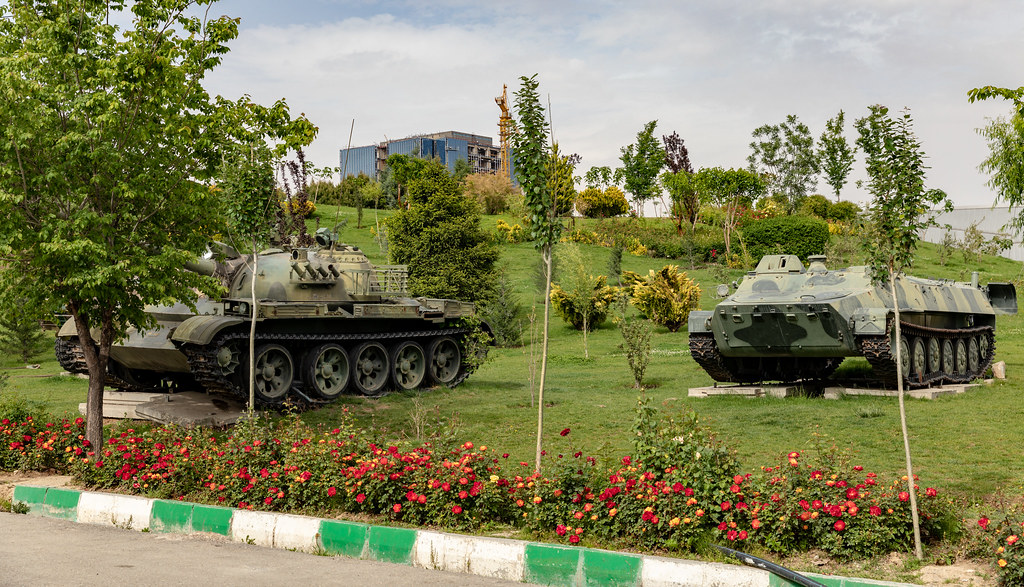The Holy Defense Museum in Teheran.
Since assuming the presidency, Donald Trump has dramatically increased political tensions with Iran. On May 8, 2018, President Trump unilaterally withdrew the United States from the Joint Comprehensive Plan of Action. Under the JCPOA, widely known as the Iran nuclear deal, Iran had promised to stop enriching weapons-grade uranium if the United States, France, Britain, Germany, China, and Russia lifted financial sanctions. Immediately after the United States abandoned the Iran nuclear deal, relations between the two countries soured. In June 2019, after the Islamic Revolutionary Guard Corps, an Iranian paramilitary group closely affiliated with the country’s clerical elite, shot down a U.S. drone over the Strait of Hormuz, Trump approved a retaliatory strike, which he then cancelled ten minutes before the operation was supposed to begin. In September 2019, Saudi Arabia and Trump blamed Iran for a crippling attack on Saudi oil facilities, an assessment which Britain, France, and Germany each corroborated within a week of the attack.
Given current tensions, even the smallest miscalculation has the potential to provoke a war between the United States and Iran. However, the United States should avoid such a conflict at all costs, as it will inevitably damage American interests both in the Middle East and around the world.
Civilian Deaths
First and most importantly, a war with Iran would likely lead to a massive number of civilian casualties. According to a 2011 study, the United States’ invasion of Iraq caused over 500,000 deaths, the vast majority of whom were civilians. Just last year, 3,804 civilians and 927 children died in Afghanistan, where the United States has been fighting the Taliban for 18 years.
A military conflict between the United States and Iran would likely lead to a greater death toll than the Iraq war. Iran is three times larger than Iraq in both population and area. Iran also has a larger military than Iraq, with an advanced ballistic missile program and armed proxy groups throughout the Middle East. The wars in Iraq and Afghanistan highlight the tragic reality of death and destruction that are the direct result of military conflict. The fact that a potential war with Iran could claim even more lives should give Trump and American defense officials pause as they consider future engagement with the Iranian government.
Provoking a Regional War
Additionally, a U.S.–Iran war might provoke a larger, multi-party conflict in the Middle East. It is possible that Iran would command Hezbollah, a militant group and political party it backs in Lebanon, to attack Israel if the United States attacks Iran. Nicholas Blanford, a Middle East scholar and senior fellow at the Atlantic Council, suggests that Hezbollah leader Hassan Nasrallah would have “no choice” but to obey such an order because of the group’s deep financial, military, and ideological links to the Iranian regime.
In July 2019, Nasrallah claimed that a war between the United States and Iran would cause Israel to be “wiped out” and highlighted potential targets throughout Israel that Hezbollah could target with precision missiles. Iran’s apparent willingness to deploy Hezbollah and its other proxy groups suggests that a war between the United States and Iran might quickly spread and engulf the entire region in violence.
Stretching the United States Budget
Lastly, the immense financial cost of war should discourage United States officials from pursuing military conflict with Iran, especially given the national debt burden’s continual growth and the need to fund domestic social programs. According to the Watson Institute for International and Public Affairs at Brown University, the War on Terror has cost the United States $5.9 trillion since 2001. Over the same time period, the national debt has increased from $5.8 trillion to $22 trillion.
The expense of a war with Iran—which would likely be larger in scale than either the Iraq War or the War in Afghanistan—might force the United States to increase the national debt to unprecedented levels. Additionally, according to the Pew Research Center, in the fiscal year 2016, 73 percent of federal spending went to funding essential programs such as Social Security, Medicare, and Medicaid. Military conflict between the United States and Iran could limit the ability of the government to fund programs that millions of Americans depend on.
Preventing the Outbreak of War
Attacking Iran could lead to a massive number of casualties, ignite a conflagration across the entire Middle East, and increase the national debt to an unsustainable level. However, relations between the two countries remain tense and even a single mistake could trigger a full-scale war. The United States should make every attempt possible to de-escalate the situation and reduce the possibility of an unnecessary and damaging war. An excellent first step would be to rejoin the Iran nuclear deal. After Trump criticized the deal as “defective at its core,” more than thirty retired generals and admirals jointly wrote an open letter urging members of Congress to support it. They maintained that diplomacy is the only viable way to address Iran’s pursuit of nuclear weapons. Instead of deepening tensions with Iran, which have almost provoked war on multiple occasions, Trump should listen to the most senior members of the American military and give diplomacy a chance. If he continues to add fuel to the fire, he might just set the entire Middle East ablaze.
Image Source: Flickr/Ninara
